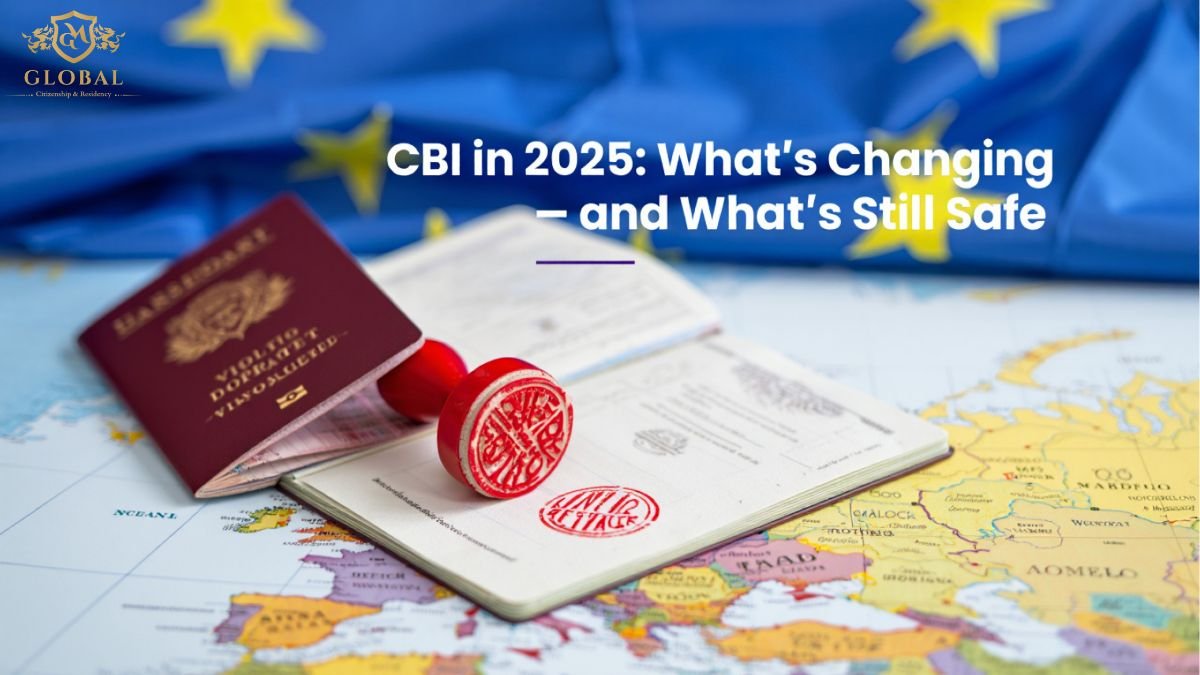In 2025, Citizenship by Investment (CBI) is all over the headlines with talk of new EU rules, possible bans, and warnings that some second passports might soon lose their visa-free access.
- It’s no wonder so many investors are now asking:
Is my second passport at risk?
Are European CBI programs coming to an end?
Do I need to rethink my mobility plans?
The short answer: yes, the rules are changing but smart opportunities are still out there for those who know where (and how) to look.
In this article, we’ll break it all down in clear terms:
✅ What’s happening with CBI EU regulations
✅ What risks (and opportunities) 2025 brings
✅ How you can protect your family’s mobility in this new landscape
What Is Citizenship by Investment (CBI)?
Let’s start with the basics: what exactly is Citizenship by Investment (CBI)?
At its core, CBI allows qualified investors to obtain a second passport by making a significant investment usually in real estate, government funds, or approved national development projects.
Unlike other immigration routes, you don’t need to live in the country, pass language tests, or spend years waiting. It’s a legal, structured path to citizenship through investment.
For many international entrepreneurs, high-net-worth individuals, and Arab family offices, CBI offers far more than just a passport. It’s a tool to:
✅ Unlock visa-free travel to dozens sometimes over 140 countries
✅ Provide greater security and contingency for the entire family
✅ Open doors to new markets for global business expansion
✅ Optimize tax exposure and support long-term wealth planning
✅ Establish a safe backup plan — a vital consideration in today’s unpredictable world
Some of today’s best-known CBI destinations include:
- St. Kitts & Nevis
- Grenada
- Dominica
- Antigua & Barbuda
- Saint Lucia
These Caribbean nations offer some of the most attractive and accessible CBI programs and have become popular choices for investors seeking mobility, security, and opportunity.
How is this different from Residency by Investment (RBI)?
Residency programs like Portugal’s Golden Visa or Greece’s Residency by Investment offer you the right to live in the country but don’t automatically grant citizenship. You’ll typically need to live there for several years, integrate into society, pass language exams, and then apply for naturalization.
In contrast, CBI gives you full citizenship (and a passport) usually within 3 to 9 months with no residency requirements.
It’s this speed and the ability to obtain a high-value second passport without relocation that has drawn interest — but also triggered greater scrutiny from EU regulators, who now worry about security and governance standards.
Why the EU Is Pushing Back on CBI Programs
The EU’s resistance to so-called “passport-for-sale” programs isn’t new but in 2025, things have heated up.
For years, the European Commission has voiced growing concerns about Citizenship by Investment (CBI), and today those concerns are being pushed with greater urgency. Here’s what’s driving the EU’s stance:
- Security risks: The fear that individuals with criminal or sanctioned backgrounds could use certain CBI programs to quietly gain access to the Schengen Area slipping through weaker vetting processes.
- Money laundering: Some countries offering CBI in the past haven’t always had the strongest due diligence systems in place, raising red flags about the potential for misuse of funds.
- Undermining EU unity: Many EU leaders argue that an EU passport and its associated rights shouldn’t be sold in a fast-track process, especially when the EU sets high standards for naturalization and residency.
Several high-profile scandals only fueled these concerns from Cyprus’ infamous “golden passport” investigation in 2020 to ongoing questions about how some CBI programs in parts of the Caribbean have handled vetting.
As a result, we’re now seeing much stronger action: EU legal warnings, infringement procedures, and most notably a political push to phase out CBI programs in EU countries altogether, while also pressuring non-EU CBI countries to raise their standards or risk consequences, like tighter travel restrictions.
Figure Out : Why Global Is a Trusted Citizenship by Investment Company ?
Recent EU Actions and Directives (2024–2025)
In the last year or two, the EU’s stance on CBI programs has really toughened — and we’re now seeing clear action, not just talk. Here’s what’s going on:
Malta: Today, Malta’s Malta Permanent Residence Programme (MPRP) remains active. It offers a residency-by-investment pathway giving investors and their families the right to live in Malta, with long-term residency status. The program is fully aligned with EU guidelines and is not under the same level of scrutiny as citizenship routes.
Cyprus: The well-known Cyprus CBI program was shut down back in 2020 after heavy criticism and political fallout. The country is still sorting through legacy cases from older applicants and continues to be watched closely by the EU.
Bulgaria: Bulgaria decided in 2022 to completely cancel its CBI program to avoid further pressure from the EU.
EU Parliament: In 2024–2025, members of the EU Parliament have gone further openly pushing for a complete EU-wide ban on all forms of investor citizenship. The message is clear: fast-track passports should not exist within the EU.
Golden Visa checks: Even investors using Golden Visas (Residency by Investment) should be aware new Schengen-wide screening rules have been introduced, making security checks tighter even for those coming in via residency pathways.
In short: the EU is serious about phasing out citizenship-by-investment programs and even residency-by-investment is facing tougher rules. It’s a fast-changing landscape, and investors need to stay one step ahead.
Are All CBI Programs at Risk?
Not at all. It’s important to remember that many of the most popular CBI programs aren’t connected to the EU so they aren’t directly affected by these new regulations.
For example, the well-known Caribbean programs in countries like Dominica, St. Kitts & Nevis, Grenada, Antigua & Barbuda, and Saint Lucia are completely independent nations. They continue to offer solid CBI options, though they are under growing pressure to maintain strict due diligence and protect their visa-free agreements with Europe.
Meanwhile, countries like Portugal and Greece which many investors look at don’t offer citizenship by investment at all.
They have residency-by-investment programs (Golden Visas), which lead to long-term residency and, eventually, citizenship through a natural process. These programs are not the target of the EU’s CBI push, though they too face higher screening now.
In Malta, the current focus is on its Permanent Residence Programme (MPRP) a well-regulated residency program that remains fully aligned with EU expectations.
EU citizenship-by-investment routes are closing fast but for now, Caribbean CBI and non-EU residency options still provide strong choices for investors — especially when approached carefully and with proper advice.
Explore top options :Top 8 Benefits of a Second Passport in 2025
What This Means for Investors in 2025
For investors, the main takeaway is this: you need to be more selective and informed than ever.
First, it’s important to know which programs are under EU influence and which ones operate independently. This helps you understand what kind of passport or residency you’re getting.
EU-linked passports may now face stricter checks, slower processing, and even future rule changes.
On the other hand, Caribbean CBI passports remain a flexible option in the short term. But this is key if any of these countries fail to maintain high standards, they could face blacklisting or lose visa-free access.
In short: if you want to protect your investment and your mobility, choose your program carefully and always work with a trusted advisor who understands the current risks and trends.
Global Mobility Planning in a Changing Landscape
In today’s world, smart investors are rethinking their mobility plans. Here’s what’s working in 2025:
- Diversify your strategy: Don’t rely on just one passport. A smart combination like a residency permit in Europe plus a second passport from a trusted CBI country gives you more options and flexibility.
- Choose quality over speed: Go for programs with strong legal frameworks and real due diligence. These are more likely to hold their value long-term and keep your family protected.
- Think about your full lifestyle: Don’t just chase the “fastest” passport. Look at how each option fits with your goals like tax planning, business access, family education, healthcare, and a safe place to live if needed.
In short: a thoughtful, well-balanced mobility plan will always outperform a rushed decision.
Pick the right CBI from : Top 8 Second Citizenship Passports in 2025 !
What to Watch for in 2025–2026
As you plan your next steps, here are some key developments to keep an eye on:
- EU elections: The outcome could shape how strict Europe becomes on citizenship and residency programs.
- Digital borders: The EU is rolling out new biometric systems and digital IDs — changing how passports are used at borders.
- Possible blacklists: If certain CBI programs fall short of standards, they could face visa restrictions or new agreements limiting access.
- Global pressure: Groups like the OECD and FATF will continue to push countries for more transparency and stronger due diligence in their programs.
In other words, the rules are evolving. Staying informed will help you protect your investment and your family’s freedom of movement.
Final Thought: Is CBI Still Worth It?
The short answer: Yes — if you choose wisely and work with experienced, licensed advisors.
The citizenship-by-investment landscape is indeed evolving. The EU’s position is tightening, standards are rising, and lower-quality programs may face increasing scrutiny. But this isn’t the end of CBI it’s a sign that only the strongest, most compliant programs will thrive.
For investors who approach this with care, CBI still offers a clear path to:
- Greater global mobility
- Personal and family security
- Business access to new markets
- Diversified lifestyle options and tax planning
- A future-proof “plan B” in an uncertain world
The key? Don’t rush for the fastest option Instead, take the time to craft a smart mobility strategy one that combines the right second passport with strong residency programs and a clear understanding of evolving regulations.
If done correctly, CBI remains one of the most powerful tools for protecting your global freedom and building opportunities for your family today, and for years to come.
At GICG, we don’t just sell programs we build future-proof plans that align with your family’s goals, business interests, and long-term security.
The world is changing your mobility strategy too.
With rising regulations, shifting EU policies, and increasing scrutiny on CBI programs, having a second passport isn’t just a luxury anymore it’s a strategic necessity.
Whether you’re rethinking your current passport, exploring safer investment options, or planning a multi-layered mobility strategy
Book your private consultation with Global GICG today and let our expert advisors guide you through the smartest, most secure investment migration opportunities in 2025 before the landscape shifts again.
FAQs:
Will my existing passport from Dominica or St. Kitts be affected?
Your passport stays valid, but visa-free access could change. Best to stay updated.
Is there a risk of my citizenship being revoked?
If all was done legally, risk is low though older cases may be reviewed.
Should I switch from CBI to PR?
If you want stronger, long-term EU access, PR is a smart move to consider.

